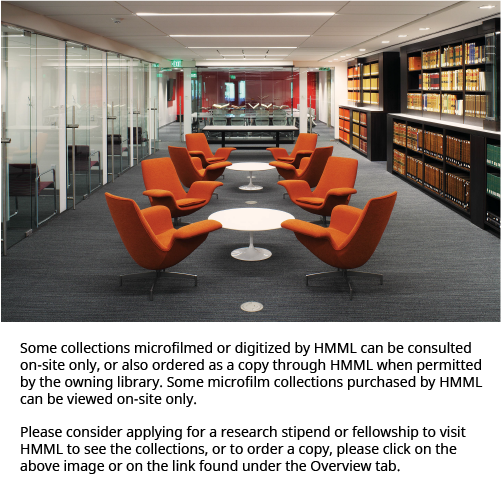«
Description
»
| Country |
Austria
 VIAF
VIAF
|
| City |
Vorau (Styria)
 VIAF
VIAF
|
| Repository | Stift Vorau. Bibliothek |
| Shelfmark | Codex Voraviensis 336 |
| Current Status | In situ |
| Type of Record | Manuscript |
| Extent | 251 leaf(ves) |
| Century(ies) | 12th century |
| Language(s) | Latin |
| Genre(s) | Prayers; Sermons |
| Notes | Quarto |
| Ext. Bibliography | P. Fank. Catalogus Voraviensis (Graecii, 1936) |
| HMML Proj. Num. |
7304 |
| Permanent Link | https://w3id.org/vhmml/readingRoom/view/7550 |
| Processed By | HMML |
| Surrogate Format | Microform |
| Access Restrictions | On-site only or order a scan |
| Rights | http://www.vhmml.org/terms |
| Type of Record | Manuscript |
| Extent | 251 leaf(ves) |
| Type | Manuscript |
| Century(ies) | 12th century |
| Year Range | 1100-1200 |
| Writing System | Roman |
| Item Location | fol. 1r-94r, 95r-242v |
| Author |
Gregory I, Pope, approximately 540-604
 VIAF
VIAF
|
| Title | Homiliae in evangelia |
| Uniform Title |
Gregory I, Pope, approximately 540-604. XL homiliarum in Evangelia libri duo
 VIAF
VIAF
|
| Language(s) | Latin |
| Item Location | fol. 94r-95r |
| Author |
Gregory I, Pope, approximately 540-604
 VIAF
VIAF
|
| Title | Oratio ad plebem de mortalitate |
| Language(s) | Latin |
| Item Location | fol. 242v-243r |
| Title | De abusionibus saeculi |
| Uniform Title |
De duodecim abusivis saeculi
 VIAF
VIAF
|
| Associated Name |
Gregory I, Pope, approximately 540-604
 VIAF
VIAF
|
| Language(s) | Latin |
| Item Notes | Excerpt; attributed to Gregory I |
| Item Location | fol. 243r-246v |
| Title | Homilia in evangelium: Liber generationis |
| Language(s) | Latin |
| Item Location | fol. 247v-251r |
| Title | Homilia in evangelium: Homo quidam nobilis abiit in regionem longinquam |
| Language(s) | Latin |
| Country |
Austria
 VIAF
VIAF
|
| City |
Vorau (Styria)
 VIAF
VIAF
|
| Repository | Stift Vorau. Bibliothek |
| Shelfmark | Codex Voraviensis 336 |
| Current Status | In situ |
| Type of Record | Manuscript |
| Extent | 251 leaf(ves) |
| Century(ies) | 12th century |
| Language(s) | Latin |
| Genre(s) | Prayers; Sermons |
| Notes | Quarto |
| Ext. Bibliography | P. Fank. Catalogus Voraviensis (Graecii, 1936) |
| HMML Proj. Num. |
7304 |
| Permanent Link | https://w3id.org/vhmml/readingRoom/view/7550 |
| Processed By | HMML |
| Surrogate Format | Microform |
| Access Restrictions | On-site only or order a scan |
| Rights | http://www.vhmml.org/terms |
| Type of Record | Manuscript |
| Extent | 251 leaf(ves) |
| Type | Manuscript |
| Century(ies) | 12th century |
| Year Range | 1100-1200 |
| Writing System | Roman |
| Item Location | fol. 1r-94r, 95r-242v |
| Author |
Gregory I, Pope, approximately 540-604
 VIAF
VIAF
|
| Title | Homiliae in evangelia |
| Uniform Title |
Gregory I, Pope, approximately 540-604. XL homiliarum in Evangelia libri duo
 VIAF
VIAF
|
| Language(s) | Latin |
| Item Location | fol. 94r-95r |
| Author |
Gregory I, Pope, approximately 540-604
 VIAF
VIAF
|
| Title | Oratio ad plebem de mortalitate |
| Language(s) | Latin |
| Item Location | fol. 242v-243r |
| Title | De abusionibus saeculi |
| Uniform Title |
De duodecim abusivis saeculi
 VIAF
VIAF
|
| Associated Name |
Gregory I, Pope, approximately 540-604
 VIAF
VIAF
|
| Language(s) | Latin |
| Item Notes | Excerpt; attributed to Gregory I |
| Item Location | fol. 243r-246v |
| Title | Homilia in evangelium: Liber generationis |
| Language(s) | Latin |
| Item Location | fol. 247v-251r |
| Title | Homilia in evangelium: Homo quidam nobilis abiit in regionem longinquam |
| Language(s) | Latin |
The institutions that have allowed their manuscripts and printed
materials to be digitized and shared with the scholarly community
through HMML generally retain certain rights associated with the
digital images. By entering vHMML Reading Room, you agree to respect
the vHMML Terms of Use, and will not copy or redistribute images of
manuscripts or printed materials from HMML’s partner libraries without
prior authorization from HMML. Misuse of images in vHMML Reading Room
may lead to suspension of your account. We encourage you to share with
HMML any publications referring to the manuscripts or printed materials
in vHMML Reading Room.
Thank you for respecting the cultural heritage of the institutions and families that have opened their libraries to the world.
Thank you for respecting the cultural heritage of the institutions and families that have opened their libraries to the world.
